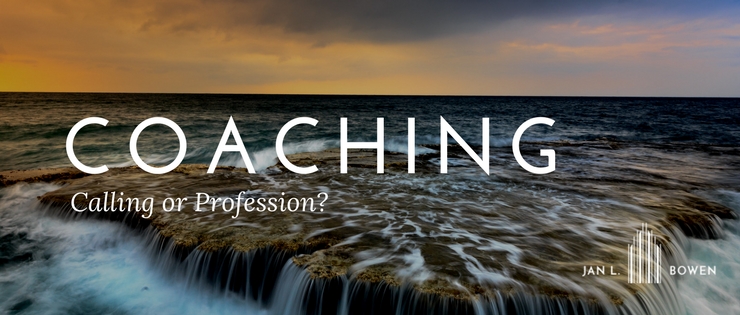What is Coaching — Calling or Profession?
What is coaching?
Coaching, when effective, is a transformative process. It’s often life changing for the client and simultaneously humbling and heart expanding for the coach.
This month’s featured Life of Purpose, LuAnn Nigara, is witnessing that experience as she expands her business from window treatments to business coaching programs. For many years LuAnn has been a visually transformative force in her client’s lives. With the launch of her podcast, A Well Designed Business, she became an influence for change. She now reaches interior designers around the globe, impacting their world. Just as they learned the lessons she presented for business, she saw the limitless potential for growth before her. Which led her to coaching.
Coaching is a tool for transformation. Listen to our conversation and you’ll hear LuAnn’s genuine gratitude for being able to play a crucial role in someone else’s life.
So perhaps it’s understandable why there are so many coaches. It’s a testament to the best part of human nature that we want to affect change and help others.
But coaching is an unregulated industry and with no universal definition or standards, leads to a quagmire of confusion. Anyone can call themselves a coach — and many do.
The Power of Words
Words are the tool we have to communicate with each other and reach understanding. We only have a certain context within our language and terminology to express concepts. Those words are up for interpretation within the coaching industry because it lacks both universally accepted definitions and a governing board.
The lack of clarity in fundamentally agreeing upon what coaching is and the roles to which a coach commits impacts both coaches and potential clients. Without at least some general understanding, the coaching industry is at risk of being diluted and downgraded rather than respected in the way it deserves.
Clients don’t know what to look for in a coach or how to find the best match for their need. When they can’t find what they were searching for they become frustrated with the process or result, and the industry suffers from a poor image.
With a common understanding, not only would prospective clients find the appropriate coach for them, coaches would be suitably matched, resulting in gratifying work.
It is a gift it is to witness the unfolding of human potential. That is a privilege, and the work of it, a calling. According to Merriam Webster, a calling is a strong inner impulse toward a particular course of action especially when accompanied by conviction of divine influence or the vocation or profession in which one customarily engages. Sound like coaching?
The Power of Effective Coaching
Coaching can feel like magic. It can also feel like hard work. It’s both.
The power of effective coaching is in unlocking growth and human potential. That is how we as humans develop.
The challenges come when we live our daily life. Coaching works through the practical blocks in life to help develop our life overall.
- Goal setting & achievement
- Gaining confidence and self-esteem
- Effective communication
- Self-accountability
We can all give advice. That’s a matter of our opinion. The ability to draw out another’s awareness while putting your own aside is a different skill.
The Power of Education
Many coaches aren’t trained. And while training, credentials, and certification can’t guarantee effective coaching, without any requirements, it isn’t obvious what skill level you’re getting when you hire a coach. What other profession would you trust your life with to an untrained practitioner?
Professional coaches use protocol and specific practices to foster awareness in their clients. While methodology differs, coaches do speak a similar language.
Here’s a breakdown of the training terms.
- Coach training: Anyone can put together a “coach training” program, graduating its students with a diploma. This further adds to the overall industry confusion. It can be challenging for prospective students to know how to evaluate the coach training programs and schools available.
- Credentialed coach: This typically refers to a coach who has trained according to the International Coach Federation (ICF) standards. ICF maintains a strict criteria to which it awards certain schools and programs the right to award its students credentials. An ICF credentialed coach will have one of three designations: ACC (Associate Certified Coach), PCC (Professional Certified Coach), or MCC (Master Certified Coach). All require initial schooling and exam, supervision, and practicums as well as ongoing education hours and active client hours. The credentialed coach also follows core competencies on which they are tested and adheres to a Code of Ethics.
- Coach certification: Coach training schools provide certification upon successful completion of their program, which often includes practicums and exam(s). Many, but not all, of these are approved by the ICF. As with Coach Training, there is no regulating board or agreed-upon standards, so quality varies. Only some of them, however, provide automatic ICF credentialing. A coach can be certified but not complete ICF credentialing.
Only the client can determine which of these factors matter. To maintain the standards, ethics, and professionalism of the industry, I would strongly argue that professional training is a requirement. Most of us wouldn’t think of going to an untrained hair stylist yet will divulge the soul’s largest desires to a person who may not be equipped to help those dreams unfold and fly.
Entry criteria to the field would refine the definitions within this professional field. There is no assurance certifications and credentials result in proficient coaching. They do indicate a level of commitment and professionalism. Some degrees and professions come to the coaching field highly qualified while some individuals enter on-line marketing with a coaching moniker with less qualifications than on-line marketing professionals.
Definitions and Distinctions
The industry has adopted some terms and codes. The International Coach Federation (ICF) has a strict Code of Ethics and credentialing criteria, to which credentialed coaches adhere. But there are no consequences for non-compliance. However, the ICF remains the standard by which the majority of professional coaches world-wide adhere. So, Wikipedia aside, listed below are some definitions and distinctions that are commonly used regarding “coaching”.
- Coaching: Quite simply, the goal of coaching is to foster awareness in a client. This is achieved frequently through an artful and strategic use of questioning with the objective to draw further insight from within the client. The client provides the answers and the goals.
Coaching is not supplying answers to the client or providing advice. For that service, look for consulting (below). It is also not imparting specific knowledge. That is teaching.
Coaching also assumes the individual being coached is whole, capable, and resourceful. In other words, they are fully functional in society. Coaching deals with the present tense and with future outcome. It doesn’t delve into past pain to resolve trauma. That service is psychotherapeutic in nature.
- Consulting: If you’re looking to give answers or advice as the professional, or get a diagnosed problem and prescribed solution, consulting is the service desired.
- Psychotherapy: Although coaches will often see clients who have past trauma and difficult situations, coaches don’t use those experiences to move into a future outcome. Coaches refer clients to psychotherapists when needed. Psychotherapy works with resolving the past, and trauma. Some psychotherapists also provide coaching services and distinguish between the two offerings.
- Mentoring: Mentoring can incorporate coaching and advising but its distinction is that the mentor provides guidance based on their experience. Coaches can be mentors but not all mentors are coaches.
- Training and Teaching: Imparting specific skills is training and teaching. It can include a linear learning path with objective knowledge (e.g., skills-based) or objective based programs (e..g, communications, team relations, etc.). Neither of these are coaching.
Doctors witness life and death — what greater sight could there be? I would contend that the birth and growth of human potential is equal to the physical evolution, and that all are connected. Coaches witness that.
To have coaching diluted as an industry downplays the importance of the unseen within all of us. Brilliant coaching is a calling, one that requires constant refinement. As a profession, it is no less sacred.
Types of Coaching
Just as we started to simplify the terms, we have more information to add. Coaching is a broad term for many services. The list below further shows why perhaps the field has gotten confused. We’re using one word to apply to many different practices. The manner in which I’ve categorized isn’t universally used. For example, “Relationship Coaching” is sometimes included as a sub-category of “Life Coaching”.
This is a partial list and doesn’t include specializations focused on approach or methodology, such as NeuroLinguistic Programming and others.
- Life Coaching (subset can include Spirituality, Purpose, etc.): The framework upon which coaching is built. Life coaches help their clients move past blocks in order to reach their ultimate potential. Life coaching can also focus on more fully understanding one’s role in the world as it relates to spirituality, purpose, work, and others. Coaching helps clients work through issues with support and structure, accomplishing goals faster and more effectively than previously experienced.
- Relationship Coaching: Relationship Coaches work with couples, families, and groups to create effective relationships. They address blocks and patterns, improve communication, and strengthen conflict resolution.
- Business Coaching (including specific skill coaching: Sales Coach, etc.): Business and skills coaching focuses on the specific skill desired (e.g., sales, revenue growth, etc.) and how to achieve that. Business coaches are frequently a hybrid of business strategist and advisor, as their work often includes helping to develop the client’s business objectives, measurements, and goals. Coaching is sometimes used in fostering a client’s ability to identify and stay focused on their business intentions. Not all Business Coaches include that development in their services.
- Career Coaching: Career coaches assist clients to find work that suits them. They frequently have a methodology they use, for example, values-based or strengths, and will often use a series of assessments to measure abilities within their clients. They can be hired to help at various stages of the process, including interviewing. The coach can be instrumental in drawing out the client’s inner confidence so they project themselves in the way they choose. A masterful coach in this category is also skilled at sifting through the information and helping the client draw out what their natural abilities are, if there are areas that could benefit from strengthening, and if their desires match where they currently are.
- Executive Coaching: Executive coaches work with an executive or leader or an organization, frequently at the C-Suite level, in relationship with their organization. Executive Coaching differs from other types of coaching in that the objective of the organization is part of the equation, along with the individual client. Executive coaching fosters the client’s capacity to effectively work with the organization to their maximum potential — personally and professionally.
- Wellness or Health Coaching: Wellness and Health Coaches work with their clients to clarify and solidify intentions, goals, and plans for health and wellness. They then work with their client to find the correct plan for their objective. They are different than Personal Trainers who create the Health and Wellness plan itself.
- Leadership Coaching: Leadership coaches work with clients in developing their leadership potential and skills. The client defines how this applies to them. It can be for an emerging leader or a polished leader, seeking to expose a new aspect of themself. Depending on the client, it can also incorporate how the individual interacts with their team.
Back to Why
One more factor to confuse the issue? Coaching techniques can be used by everyone — and are. Many great books have been written on how to use them. Using those techniques in a family, an organization, and a group is a positive use of coaching skills. And it can sometimes be just enough to mislead someone to thinking they might be a coach.
There’s a difference between using techniques in an application and being a coach professionally. Ongoing support and objectivity are often missing in more casual applications of these techniques. The skillful use of questioning can still be helpful, though.
The fact that there is a wide interest in coaching now (as of 2016, there were 53,300 professional coaches) is a powerful statement of hope for a future global society filled with functioning, self-aware individuals engaged in caring relationship to each other. Individuals wanting to be coaches shows the strong predilection towards wanting to impact others lives for good. People looking to be coached show themselves wanting to improve themselves and their lives. All of that desire and action for good is an intense momentum towards change.
Let’s make that effort long lasting by ensuring the quality is at the level we all know it can be. As coaches, it’s our responsibility to have integrity in how we present ourselves and in how we uphold our professionalism. As clients, it’s up to us to ensure we’re engaging the proper profession for the job. We need to do the research to hire the person who is as committed as we are to our development.
One World
As a coach, I personally consider my work a sacred honor. My business doing my work is not a system of on-line entrepreneurship. It is a professional practice in which I uphold the highest personal standards of education, growth, and integrity so that I can best serve my clients. I don’t know what impact I have on my clients, or even if I do. My desire is to foster the awareness for the growth they desire. If they tell me I have impacted them, I am grateful to have played a part.
Coaches are entrusted with other’s lives. It is our responsibility to uphold the criteria that best serves their needs. We can begin by clearing defining our terminology.
That’s the way this world works. One by one, group by group, we are evolving. Coaching assists in the transformation. It’s a beautiful thing.
Yes, I’m a credentialed coach (ICF – PCC). I would love to help you on your journey IF coaching is what you want, need, and are looking for. Still have questions? I made a Readiness Quiz exactly for that reason. You can take it here. Otherwise, if you’re ready, let’s do this! [/vc_column_text][/vc_column][/vc_row]



